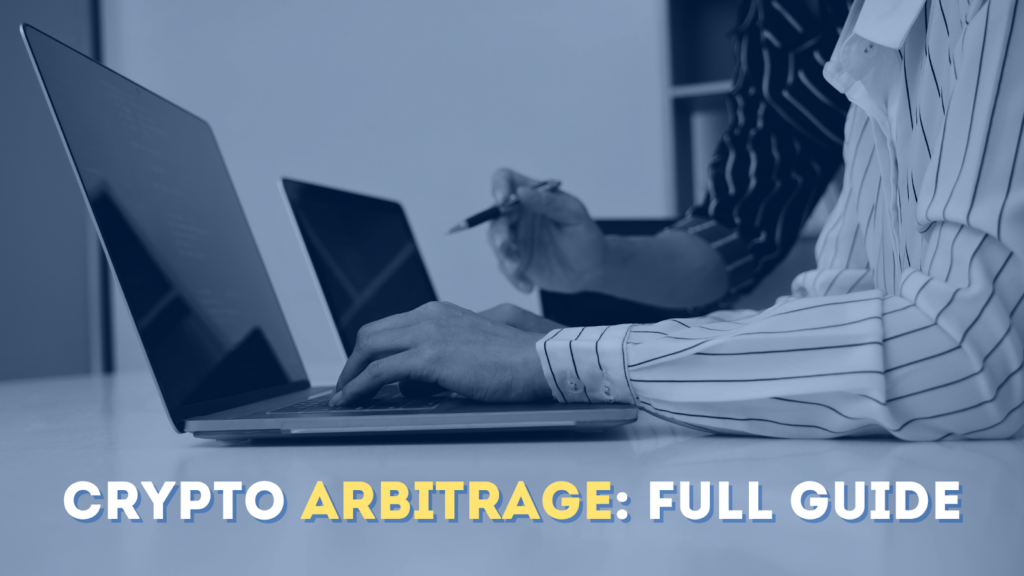Crypto Arbitrage Trading — MUST Know This Before Starting!

Crypto arbitrage is a practical strategy with minimum risks (at least, it seems so when you first find this option). Crypto arbitrage trading means buying an asset on one exchange and using another trading platform to sell it for a higher price.
Before falling for arbitrage cryptocurrency trading, enthusiasts must know everything about the following concepts, practices, and potential results.
What Is Arbitrage Crypto Trading: Theory and Practice
In its briefest form, arbitrage crypto trading defines an activity of making profits by taking advantage of an asset’s price difference on two exchanges.
Here is a cryptocurrency arbitrage example. Suppose a Token costs $100 on Coinbase, but it costs $101.5 on KuCoin. An arbitrageur rushes to purchase tokens for $100 and sells them all for $101.5. If they manage to sell only twenty tokens like that, they already have a profit of $30.

Such a scenario is ideal. For instance, fees might make deals less profitable. There can be additional challenges we will see later.
Also, an arbitrage trade crypto strategy is nothing new. It had been a thing since immemorial times, and its term was offered by Mathieu de la Porte at the beginning of the 1700s in his work you can see here.
Arbitrage Crypto Trading Types (by Activity Specifics)
Trading cryptocurrencies in an arbitrage manner can differ. Here are the main types.
| Term | Explanation |
|---|---|
| Triangular a. | Exploiting price difference between three assets. Buy → buy another currency from a crypto exchange with a better price for it → sell. For example: Buy BTC → buy ETH for BTC (one price rate) → buy LTC for ETH (another price rate) → buy BTC for that LTC → profit → repeat. |
| Latency a. | That is when institutional crypto holders have an advantage over others and enjoy a higher trading speed, while regular enthusiasts need more time to receive a trading signal. |
| Geographical a. | That means looking for price differences by region. Exchanges in different countries have different values. For example, you buy an asset from an Eastern European market where the crypto coin is cheaper and then sell it using a US exchange, or vice versa. |
Comparing Manual VS Automated Cryptocurrency Arbitrage Trading

Crypto arbitrage bots are tools many enthusiasts use or want to use for more profits and faster operations. Nevertheless, a significant part of cryptocurrency holders and traders are partly against such automation as no mechanism guarantees success and has a human-like “mind” to analyze actions and perform optimally.
What advantages can crypto arbitrage bots bring, and what detriments await traders who hope to make all money in the world? Let us see.
? Manual cryptocurrency arbitrage trading
What is good about this cryptocurrency arbitrage trading type?
- Arbitrageurs have 100% control over their actions.
- They rely on themselves solely without entrusting real money to a program that might be faulty.
- Such an approach allows a deeper understanding of market situations and assets, as arbitrageurs consider economic conditions, event peculiarities/connections, urgent news, and market sentiment.
What can we say regarding the disadvantages?
- Manual market research for cryptocurrency arbitrage attempts is more time-consuming.
- Humans are selective in everything they learn about. For instance, being enthused by events like a celebrity supporting some assets, traders can ignore significant factors and make emotion-driven decisions instead of rational ones.
- Traders often have to stay updated 24/7 and work without the much-needed rest. Given how cryptocurrencies and volatile and how exchanges change prices every minute or even second, it is unbearably challenging to ensure flawless performance. So, there is rarely a guarantee your crypto arbitrage trade will be 100% successful.
- Traders may miss important news and go for assets that have lost value, which isn’t yet shown.
Using a crypto arbitrage bot
Buying and running a cryptocurrency arbitrage bot can help overcome most manual approach difficulties. So, you may expect the following:
OFC, there are problems.
The Risks of Cryptocurrency Arbitrage Trading

Arbitrage crypto trade operations might seem okay or even great in theory. Nevertheless…
Fees and dust
The #1 thing making your profit null is cryptocurrency trading fees. You have to pay gas fees in most cases, and the volume of your trade influences the commission loss, but there can also be hidden ones. Automated trading systems might make you lose more because you spend cash on maintenance, but your profit is so insignificant it cannot even cover the software.
Additionally, “dust” grows when you repeatedly make small transactions, paying fees that are worth more than what you want to send.
Timing fails
It is no use explaining how cryptocurrencies are volatile and change their value every millisecond. But you can learn more here.
1-15% drops and uprises happen daily, and missing an event means missing a good opportunity to profit. Furthermore, arbitrageurs must monitor several exchanges and assets to ensure success. Additional problems like blockchain speed, connection interruptions, and WI-FIs just acting make timing failures a common problem among arbitrageurs.
Crypto gets stuck
Cryptocurrencies might get stuck in blockchains, which is unpleasant even when you are not an arbitrageur. It takes manual work, long communication, and days of waiting to get your asset or deliver it to your buyer. Given that arbitrages usually give you low profit, that makes their profitability null.
Moreover, you might be using an automated system and not notice that your deals are delayed. That scenario is worse, and I hope it will not happen to you.
Scams…
Eh, no comments.
Okay, comments.
Such a trading manner means performing many and more operations with different buyers. You must “meet” hundreds of crypto holders to make a $20–50 cryptocurrency profit. Furthermore, scams know that enthusiasts who prefer arbitrage crypto deals seek good price differences. Hence, scams can inflate a price artificially and make you believe that you can sell an asset and get a great change, but the result will be negative.
Trading volume problems
Beginners usually start with affordable assets, which is understandable. Yet, those assets often get removed from exchanges if their trading volume falls. So, you might have a working strategy and attain success, but it will become nothing if your prioritized coins are not on an exchange anymore.
Blockchain conflicts
The best cryptocurrency trading deal might not be possible because your buyer uses another blockchain. Different wallet formats may not let you and your buyer exchange assets because most coins need specific blockchains.
Regulatory gaps
DeFi has its advantages, but regulation challenges impose serious risks. The international standards have yet to be unified. So far, this is not a field for everyone because there are…
- Crypto whales that manipulate prices
- Exchanges that fight for dominance and make crypto competitions harder; for example, Uniswap and Sushiswap governance conflicts
- Taxation challenges and money laundering
- KYC problems
- Lack of mechanisms to fight against scams and detect unlawful activities, etc.
Um, Is Arbitrage Legal, Then?.. ⚖️

Yes! I must even say arbitrage trading is good for economies.
Moreover, several states and countries, including the US, encourage cryptocurrency trading specialists and enthusiasts. Despite the One Price Law, benefitting from net differences converges prices in various markets faster than most operations. So-o-o, such crypto trading manners help ensure market liquidity and contribute to market efficiency.
Moreover, this trading tactic helps minimize price discrimination and supports purchasing power parity. By having one offer cheaper somewhere, arbitrageurs motivate alien buyers to exchange money for another currency, creating a natural demand for it.
For example!
You live in Poland and want to buy a good expensive car. Your Romanian friend says that this car is significantly cheaper in their state. So, you go to Romania, exchange złoty for leu, buy an identical car in a Romanian salon, and go to Poland to show off the brand-new metal stallion you have saved good money on. Good deal! Then some of your Polish friends might want to do the same, creating a demand for leus. That, in turn, will signal Romanian businesses that their offers are becoming more popular. So, they will raise prices cent by cent until prices for Romanian vehicles equate to those in Poland.
Hence, progressive systems appreciate arbitrageurs, including those who go for crypto arbitrage.
How Do I Get Started?
Final Words
The arbitrage crypto strategy is not ideal, like anything in all economies and in our world. Be that as it may, many cryptocurrency investors, traders, and enthusiasts can profit and positively affect an economy.
Choose this strategy, being mindful of risks, and you will succeed. Happy trading!
